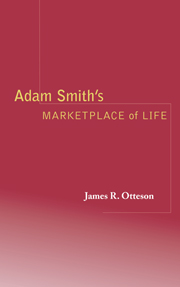Book contents
- Frontmatter
- Contents
- Preface
- Abbreviations
- Introduction
- 1 Adam Smith's Moral Theory, Part One: Sympathy and the Impartial Spectator Procedure
- 2 Adam Smith's Moral Theory, Part Two: Conscience and Human Nature
- 3 The Marketplace of Morality
- 4 The “Adam Smith Problem”
- 5 The Market Model and the Familiarity Principle: Solving the “Adam Smith Problem”
- 6 Justifying Smithian Moral Standards
- 7 The Unintended Order of Human Social Life: Language, Marketplaces, and Morality
- Conclusion
- Bibliography
- Index
7 - The Unintended Order of Human Social Life: Language, Marketplaces, and Morality
Published online by Cambridge University Press: 05 June 2012
- Frontmatter
- Contents
- Preface
- Abbreviations
- Introduction
- 1 Adam Smith's Moral Theory, Part One: Sympathy and the Impartial Spectator Procedure
- 2 Adam Smith's Moral Theory, Part Two: Conscience and Human Nature
- 3 The Marketplace of Morality
- 4 The “Adam Smith Problem”
- 5 The Market Model and the Familiarity Principle: Solving the “Adam Smith Problem”
- 6 Justifying Smithian Moral Standards
- 7 The Unintended Order of Human Social Life: Language, Marketplaces, and Morality
- Conclusion
- Bibliography
- Index
Summary
In the last few decades interest in Adam Smith's noneconomic writings has burgeoned. One area of Smith's work that has particularly enjoyed this increased interest is that concerned with language, rhetoric, and belles lettres, though his early essay on the development of languages has seen relatively little attention. This essay deserves attention, however, because upon examination it reveals hints of the same model for understanding the growth and development of human institutions that I have argued Smith employs as the conceptual foundation of his later The Theory of Moral Sentiments and in The Wealth of Nations. Indeed, it may be the case that Smith thought his market model was the key to understanding the development and maintenance of all large-scale human institutions. In the absence of explicit textual evidence of such an intention, however, I will limit my claim to this: the market model is at work in the essay on language, in TMS, and in WN, as well as, to varying extents, in some of Smith's other works, and the model can moreover serve as an organizing principle for understanding his examinations of human institutions generally.
In this chapter, I would like to examine Smith's short essay on languages, as well as resume the discussion of his argument in WN, and show how Smith's market model is at work in each of them. I shall also take a somewhat briefer look at some indications of this model elsewhere in Smith.
- Type
- Chapter
- Information
- Adam Smith's Marketplace of Life , pp. 258 - 289Publisher: Cambridge University PressPrint publication year: 2002



